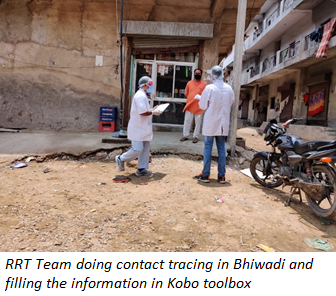With COVID-19 cases increasing in parts of the country due to lifting of restrictions and resumption of economic activities, technology-based surveillance was deployed in Bhiwadi and Alwar, Rajasthan to strengthen surveillance gaps and identify hotspots.
Earlier in May this year, when the COVID-19 cases in India were on an upward trajectory, Alwar district in Rajasthan reported just a little more than 50 cases. However, the lack of systematic data entry and poor tracking of the infection led to major surveillance gaps leading to a significant spike in the number of cases.
The district authorities took stock of the challenges and implemented measures through use of technology to strengthen its response and preparedness measures. Coordinated efforts were galvanized through inter-sectoral collaboration to deliver targeted response.
“Containing the spread of COVID-19 was a challenge in Bhiwadi being an industrial area after unlock-1, however the district administration responded very aggressively with the support of WHO and we were able to contain the transmission”, stated Shri Akhil Arora, Principal Secretary, Medical Health and Family Welfare, Government of Rajasthan.
Use of technology to scale up contact tracing efforts: A plan was rolled out under the supervision of the District Magistrate’s office to augment the contact tracing efforts in the city. Multisectoral partnerships were forged with various departments such as Police, Bhiwadi Integrated Development Authority (BIDA), Chief Medical Health Officer (CMHO), and WHO Country Office for India. Kobo Toolbox, a software for data collection was used for data management and case mapping.
“Data management and contact tracing was a big challenge in Bhiwadi and Alwar. With the use of technology, district health team with technical support from WHO helped in data collection, data management and case mapping. The data insights helped us in mapping the disease hotspots and take appropriate actions to strengthen the response and preparedness measures,” shared Dr Ravi Prakash Sharma, Director State Institute of Health and Family Welfare cum Additional Director Public Health and State Nodal officer for COVID management, Government of Rajasthan.

Rapid Response teams deployed to oversee data gathering: Given the need for accurate data during emergencies, 12 rapid response teams (RRTs) with 30-40 team members were constituted in Bhiwadi and Alwar and trained on contact tracing approaches using Kobo Toolbox. The tool enabled capturing and compilation of location-based data at the district level swiftly.

Data management teams from Bhiwadi Integrated Development Authority (BIDA) and Urban Improvement Trust (UIT) ensured systemic data entry which was further analyzed at the district WHO surveillance unit. Mapping of data helped in identifying COVID-19 clusters and the information was further shared with district administration to facilitate quick decision making and execute tailored strategies and containment measures, with the support of Nagar Parishad.
Geographic information system to identify hotspots: Rajdharaa, a state-wide unified gateway based on geographic information system (GIS) was established by the Department of Information Technology (DoIT) to map clusters across Alwar and Bhiwadi region. WHO team provided support in streamlining the data collection process. To facilitate this, a data centre was established by the DoIT and WHO to process all incoming data.
The following tailored containment strategies were executed in high-risk areas:
- Rapid response teams visited the identified hotspots to survey for severe acute respiratory infections (SARI) and influenza like illness (ILI) cases, and implement local containment measures
- Strict home isolation measures for confirmed cases and their contacts were enforced in the areas where clusters were identified.
- Mobile OPDs (out-patient departments) and testing booths were set-up in these areas for high-risk groups, such as the elderly, pregnant women, and those with ILI and SARI symptoms.

Coordinated efforts across the district focusing on containment and mitigation strategies, with technology-based measures at its core, provided the much-needed impetus to slow down the increasing number of cases in Alwar towards the end of July. The KoBo toolbox and the revamped data management methods were a game-changer. The key to management of COVID-19 in Alwar has been the adoption of digital technology and integrating it into policy.
The use of technology in Alwar provides a template for the application of digital technologies in emergency management and response, highlighting the ways in which the city adopted these technologies for surveillance, testing, contract tracing, quarantine, planning response strategies and providing health care to the high-risk population in the containment areas.
Surveillance is fundamental to public health decision making and guided action. The technology innovations helped in generating evidence to guide policy decisions. States across the country are stepping up and implementing technology-based response measures to track the novel coronavirus. This has helped immensely in tracking undiagnosed cases and strengthening contact tracing measures”, stated Dr Roderico Orfin, WHO Representative to India.
